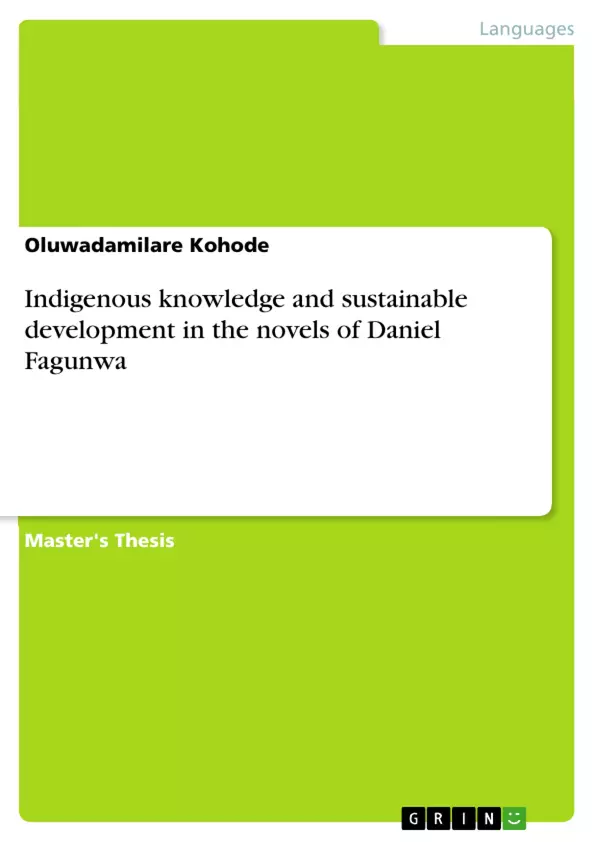This study reveals that Fágúnwà, in his five novels, consciously adresses the issue of sustainable development through the use of indigenous knowledge. Fágúnwà, for instance, emphasises the utilisation of the Yorùbá indigenous knowledge, such as its medicine and health care, the indigenous corpus of folktales and fables, the indigenous technology among others, for sustainable development.
His inclusion of the moonlight tales in his novels is a weapon for sustainable development by inculcating the right virtues in the children and ensuring the subsistence of their indigenous culture. This will help the children to become good future leaders and members of the community. He encourages subsistence farming by all households in order to reduce hunger, unemployment and to inculcate hard work in the children.
This will lead to sustainable development of self-reliance in every family. Fágúnwà also espouses relationship with neighbouring and far away towns in order to acquire more knowledge for sustainable development. He supports voyage to gain knowledge on administration, management and peaceful existence. Àkàrà Ògùn, Olówó-aiyé, Ìrèké and Àdìtú all embark on expeditions to sustain their communities. These, among others, are Fágúnwà’s ways of projecting sustainable development through the Yorùbá indigenous knowledge.
Hence, this study concludes that Fágúnwà’s novels, through its reflection of the Yorùbá indigenous knowledge, project sustainable development. This means the Yorùbá indigenous knowledge if well employed will aid sustainable development. Therefore, the focus of this study on the reflection of indigenous knowledge and sustainable development in Fágúnwà novels, is believed, will instigate scholars to study more on the concept of indigenous knowledge, its significance and relevance to sustainable development.
Inhaltsverzeichnis (Table of Contents)
- Abstract
- Dedication
- Acknowledgement
- Chapter One: Introduction
- Background to the Study
- Statement of the Problem
- Objectives of the Study
- Research Questions
- Scope of the Study
- Significance of the Study
- Limitations of the Study
- Definition of Terms
- Chapter Two: Literature Review
- The Concept of Indigenous Knowledge
- The Importance of Indigenous Knowledge in Sustainable Development
- Sustainable Development: A Global Perspective
- The Two Pillar of Sustainability
- Indigenous Knowledge System: A Theoretical Framework
- The Role of Literature in Promoting Sustainable Development
- Fágúnwà's Novels: A Critical Review
- Chapter Three: Methodology
- Research Design
- Population and Sample
- Data Collection Methods
- Data Analysis Techniques
- Chapter Four: Data Presentation and Analysis
- Sustainable Development in Fágúnwà's Novels
- The Reflection of Indigenous Knowledge in Fágúnwà's Novels
- The Role of Indigenous Knowledge in Sustainable Development in Fágúnwà's Novels
- Chapter Five: Summary, Conclusion and Recommendations
- Summary of Findings
- Conclusion
- Recommendations
- Bibliography
Zielsetzung und Themenschwerpunkte (Objectives and Key Themes)
This study aims to critically examine the projection of sustainable development through the appropriation of indigenous knowledge in the novels of D.O. Fágúnwà. It explores how Fágúnwà's works reflect and utilize Yorùbá indigenous knowledge to promote sustainable development practices and address contemporary societal challenges.
- The role of indigenous knowledge in sustainable development
- The portrayal of sustainable development practices in Fágúnwà's novels
- The relationship between indigenous knowledge and the two-pillar model of sustainability
- The impact of Fágúnwà's novels on promoting sustainable development in Yorùbá society
- The significance of Fágúnwà's works in the context of contemporary debates on sustainable development
Zusammenfassung der Kapitel (Chapter Summaries)
Chapter One: Introduction
This chapter provides the background to the study, outlining the problem, objectives, research questions, scope, significance, limitations, and definition of key terms. It establishes the context for the research and highlights the gap in existing scholarship.
Chapter Two: Literature Review
This chapter examines relevant literature on indigenous knowledge, sustainable development, the two-pillar model of sustainability, indigenous knowledge systems, and the role of literature in promoting sustainable development. It also provides a critical review of Fágúnwà's novels.
Chapter Three: Methodology
This chapter describes the research design, population and sample, data collection methods, and data analysis techniques employed in the study.
Chapter Four: Data Presentation and Analysis
This chapter presents and analyzes the data collected from Fágúnwà's novels. It examines the portrayal of sustainable development practices, the reflection of indigenous knowledge, and the relationship between indigenous knowledge and sustainable development in the novels.
Schlüsselwörter (Keywords)
The core concepts and terms explored in this research include indigenous knowledge, sustainable development, the two-pillar model of sustainability, indigenous knowledge systems, and D.O. Fágúnwà's novels. The study delves into the relationship between these concepts and examines their significance in the context of Yorùbá society.
How does D.O. Fágúnwà address sustainable development?
Fágúnwà uses indigenous Yorùbá knowledge, such as traditional medicine, technology, and folktales, to promote self-reliance and community well-being in his novels.
What is the role of Yorùbá folktales in sustainability?
Moonlight tales in his works serve as a tool to instill virtues in children, ensuring the preservation of culture and preparing them as future leaders.
Why does Fágúnwà encourage subsistence farming?
He promotes farming to reduce hunger and unemployment while teaching the value of hard work to the younger generation.
What is the "Two Pillar" model of sustainability mentioned?
The study explores how indigenous knowledge systems align with theoretical frameworks of sustainability to balance environmental and social needs.
Which novels are included in this study?
The research focuses on Fágúnwà’s five major novels, analyzing characters like Àkàrà Ògùn and Olówó-aiyé on their expeditions for community survival.



